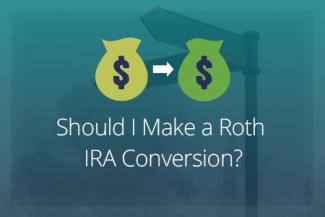
When is a Roth Conversion NOT a good idea?
There is no denying the tax-free benefits of Roth IRAs. Whether in the form of a direct contribution or a conversion, adding money into a Roth IRA is generally a good idea. With a conversion, however, there are a few caveats to keep in mind as it may not always be the best move. Below are a few situations in which one may want to think twice before going through with a Roth conversion.
- Larger Tax Liability: When a conversion takes place, you will effectively be paying ordinary income taxes on the amount that was converted. Depending on the amount converted, it could push you into a higher tax bracket.
- Tax Rates May Change: One of the main goals of a Roth conversion is to pay less tax now than you would on the same distribution in the future. However, if there is a significant change in federal tax rates, or your own personal income decreases, you may end paying more now than you would in the future.
- Beneficiary Tax Rate: Often, individuals see Roth IRA assets as money that will be left to their heirs. Roth conversions may be a good idea if you want to “pre-pay” the tax for beneficiaries. However, if said beneficiaries will be in lower tax rate that you are now, then it may not be the best move to “pre-pay” the tax now at a higher tax rate.
- Itemizing Medical Expenses: If it is your intention to take the itemized deduction instead of the standard deduction, keep in mind that Roth Conversions increase your Adjusted Gross Income, thus increasing the threshold for itemizing your medical expenses.
- Medicare Premiums Could be Higher: If one is near Medicare age or already on Medicare, Roth Conversions can temporarily make one subject to IRMAA (Income-Related Monthly Adjustment Amount), which will increase your Medicare Part B and Part D premiums. Keep in mind that doing a Roth Conversion in the current year will affect your Medicare premiums in two years. For more info as to how IRMAA works, see our blog about it here.
Overall, Roth conversions are a great way to build tax-efficient wealth over time. Depending on one’s situation, it may not be an appropriate strategy to consider. This should, however, be reviewed annually as one’s financial situation can change. It is recommended that one consults with a tax advisor or a financial advisor to weigh the pros & cons of considering this.
Weingarten Associates is an independent, fee-only Registered Investment Advisor in Lawrenceville, New Jersey serving Princeton, NJ as well as the Greater Mercer County/Bucks County region. We make a difference in the lives of our clients by providing them with exceptional financial planning, investment management, and tax advice.

